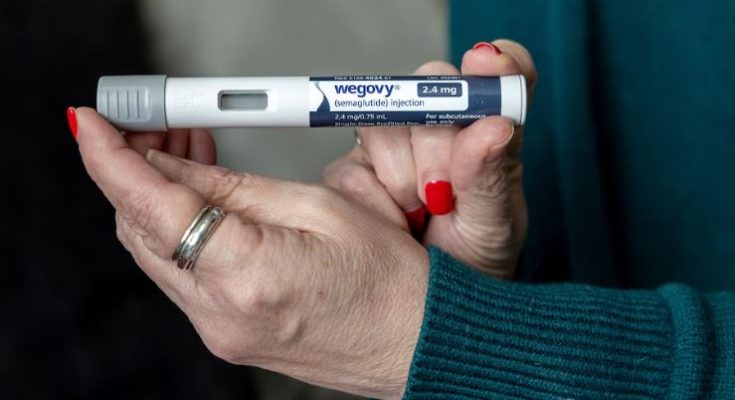The drugmaker will offer its blockbuster weight-loss drug for $499 a month, joining Eli Lilly, which made a similar move last year with Zepbound.
The FDA had listed semaglutide in shortage for more than two years as Novo Nordisk struggled to meet the seemingly bottomless demand for its appetite-suppressing drugs. Under government rules, the listing allowed compounding pharmacies to make their own, cheaper versions and spawned an alternative marketplace for off-brand weight-loss drugs.
Now Novo Nordisk and rival Eli Lilly are seeking to capture the large market of consumers who purchased compounded weight-loss drugs to get lower prices.
David Kim, an assistant professor of medicine at the University of Chicago, said that the popularity of compounded weight-loss drugs has shown how much demand there is for lower-cost options. The drugmakers, he said, “are kind of recruiting back patients who are on those compounded drugs.”
Until now, Novo Nordisk had offered Wegovy at a discounted price of $650 a month to cash-paying patients. With the launch of its own pharmacy service, the company said it will also offer the $499-a-month price to those paying cash at traditional pharmacies “in the near future.”
Novo Nordisk’s new offering follows a model that Eli Lilly launched last year, offering vials of its weight-loss drug Zepbound at a discount directly to consumers paying cash. Last week, Eli Lilly lowered the price of its starting dose to $349 a month and added two higher doses for $499 a month, though it hasn’t made all doses of Zepbound available through the direct-pay program.
“We have more than 100,000 people using the service today, and I expect it to expand dramatically from here,” Dave Ricks, Eli Lilly’s CEO, said in an interview with The Washington Post last week. “But that’s not actually our goal. Our goal is actually to have coverage under the regular system. This is a workaround that we’re providing.”
He added that the company’s profit margins on the vials, which have to be drawn by a syringe, are “not quite as good” as those that come from its auto-injector pens, given costs associated with running a pharmacy such as shipping and pharmacists to fill prescriptions.
Novo Nordisk’s stock price had risen about 4 percent in trading as of early afternoon Wednesday. Shares of Hims & Hers, a telehealth provider that last year began offering compounded semaglutide, have tumbled about 40 percent since the FDA said the shortage was over and told compounders to stop making copies of weight-loss drugs by May. Compounding pharmacies have sued the agency over its determination.
Novo Nordisk has been under political pressure over the cost of its Wegovy and Ozempic. Melissa Barber, a postdoctoral fellow at Yale University who led a study finding semaglutide could be profitably made for less than $5 a month, said Novo Nordisk is “trying to capture a number of people at their respective price points.” Compared with what consumers in Germany and the Netherlands pay, she said, “it’s still a substantial markup.”
In September, the Senate Health Committee grilled Novo Nordisk CEO Lars Fruergaard Jørgensen over why Wegovy and Ozempic cost hundreds of dollars less per month in countries such as France, Canada and Germany. “Stop ripping us off,” Sen. Bernie Sanders (I-Vermont), the committee chairman at the time, said at the hearing.
Jørgensen said at the Senate hearing the company didn’t control the price that patients pay and blamed the complexity of the American health-care system. Studies like the one led by Barber, he said, don’t take into account the expensive work of research and development, or building the manufacturing facilities necessary to churn out the drugs.
The Biden administration, in its final days in January, said the federal government would negotiate maximum prices that Medicare pays for Ozempic and Wegovy — among other prescription drugs — under the Inflation Reduction Act. That process will now be overseen by Trump officials, who also will have to decide whether to act on a Biden administration proposal to expand access to weight-loss drugs to millions of Medicare and Medicaid beneficiaries.

